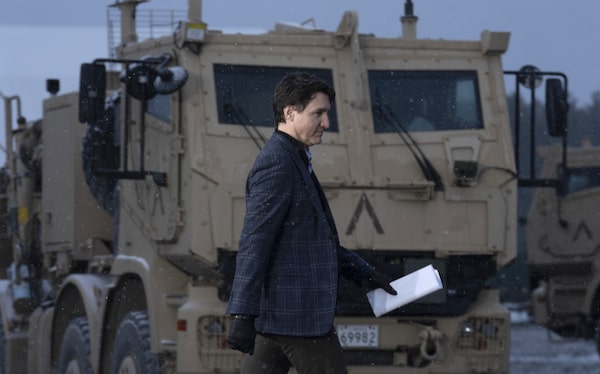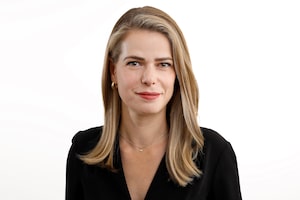
Prime Minister Justin Trudeau walks to the podium for a joint news conference at a military base in Adazi, Latvia, on March 8.Adrian Wyld/The Canadian Press
Prime Minister Justin Trudeau pledged “highly specialized military equipment” to Ukraine as part of a new shipment for the war-torn country, but rejected President Volodymyr Zelensky’s renewed pleas for a no-fly zone after Russia bombed a maternity hospital, saying it would not help Ukraine.
At a press conference alongside Germany’s Chancellor Olaf Scholz in Berlin on Wednesday, Mr. Trudeau said Canada would send $50-million worth of military equipment, including what he called Canadian-made cameras that a source said are used on Turkish-made drones. The government provided no details about what the cameras do, but the source said they are made by Ontario-based L3Harris Wescam.
The Globe and Mail is not disclosing the source’s name because they were not permitted to disclose the details of the deal.
Follow live updates on the war in Ukraine
Ukraine attempts more evacuations as heavy fighting with Russia continues
The same Ontario company makes the air-strike targeting gear in Turkish drones used by the Ukrainian military. The government did not confirm on Wednesday whether the equipment is the same, however, a separate source said it was.
“We have obtained a number of specialized equipment, including cameras used in drones,” Mr. Trudeau said. The Prime Minister did not say when the equipment would be sent to Ukraine but said shipments would start in the “coming days.”
Kyiv is using Turkish-made Bayraktar TB2 military drones to strike back at Moscow’s invasion, with some success. Ukraine’s military has said the drones successfully attacked Russian convoys and blew up tanks and surface-to-air missile systems. Last week former Ukrainian ambassador to Canada Andriy Shevchenko said the drones offer delivery systems for precision-guided weapons at a fraction of the cost of a fighter or bomber.
Dave Perry, president of the Canadian Global Affairs Institute, said the “camera/targeting systems” effectively “blow up stuff on the ground.” He said they have the added benefit of already being used by the Ukrainian military.
“We’re helping them acquire more drones they already use as opposed to trying to get them a weapon they would need lots of training before using,” Mr. Perry said.
The Department of National Defence said two military aid shipments announced prior to Russia’s invasion of Ukraine have already been delivered. But spokesperson Daniel Le Bouthillier said he couldn’t provide an update on the status of two subsequent pledges of military aid because of the changed security situation and to “ensure the safety of our personnel and our operations.”
Mr. Trudeau said the government would also spend $3-million to help combat Russia’s misinformation campaign against Ukraine.
The Prime Minister was in Germany Wednesday for the third day of his whirlwind tour through Europe and was joined by Deputy Prime Minister Chrystia Freeland and Foreign Affairs Minister Mélanie Joly for meetings at the German Chancellery. In the past three days, Mr. Trudeau has met with leaders from eight countries in the North Atlantic Treaty Organization. On Thursday he is travelling to Warsaw for meetings with Poland’s President Andrzej Duda and U.S. Vice-President Kamala Harris.
While Germany has already made a fundamental shift in its military spending and defence policy in response to Russia’s war in Ukraine, Canada has not. At the end of February, Mr. Scholz announced a €100-billion cash injection for the military and pledged to bring its defence spending in line with NATO’s 2-per-cent-of-GDP target.
Canada lags far behind that target, spending an estimated 1.39 per cent of GDP on defence. At a security forum speech beside Berlin’s iconic Brandenburg Gate, Mr. Trudeau noted Germany’s “historic announcement,” but his government has made no comparable pledge.
Outside the forum on Wednesday, Ms. Freeland said she was in Berlin in part to meet with European officials about the “tremendously” altered geopolitical context as the government considers boosting Canada’s defence spending.
“Certainly, defence spending is something we have to look at carefully,” said Ms. Freeland, who is also Finance Minister. “It’s very important and valuable for me, as we finalize the budget, to have some first-hand conversations about exactly the changes on the ground.”
During a question-and-answer period, Mr. Trudeau said he believes “unquestionably” that Ukraine will win the war and survive as a sovereign country.
He also again ruled out a no-fly zone over Ukraine and said it would not be helpful. “Direct conflict between NATO planes, or fighters, and Russia, would not bring about a better outcome for Ukrainians. Nor would it bring out a better outcome, especially, for the rest of the world.”
Just minutes before the Prime Minister spoke, Mr. Zelensky sent out another appeal for the military intervention above his country. On Wednesday a Russian air strike hit a maternity hospital in Mariupol. Seventeen people, including women in labour, were injured in the attack.
“How much longer will the world be an accomplice ignoring terror?” Mr. Zelensky asked. “Close the sky right now! Stop the killings! You have power but you seem to be losing humanity.”
With a report from Steven Chase in Ottawa.
For subscribers: Get exclusive political news and analysis by signing up for the Politics Briefing.
 Marieke Walsh
Marieke Walsh